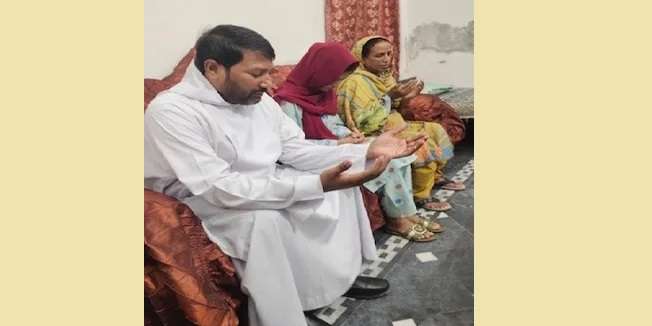On June 11, 2025, a heartbreaking tragedy struck the Masih family in Burewala, Punjab, when their 14-year-old daughter, Elishba Adnan, was abducted from their home. Elishba, a young girl from a Christian family, was taken by 26-year-old Babar Mukhtar, a man with known connections to the family. What followed was a deepening of their agony as police failed to take action, leaving the Masih family desperate for answers and justice.
Elishba’s father, Adnan Masih, a sanitation worker, immediately reported his daughter’s disappearance to the police. Despite his cries for help, the authorities refused to register a First Information Report (FIR), a crucial step for initiating a legal investigation. Masih’s repeated visits to the police station in search of assistance were met with indifference. His anguish, compounded by the lack of a legal response, grew as each day passed with no progress in recovering his daughter.
Seeking help, Masih turned to human rights advocate Albert Patras, who took up the cause. However, when Patras contacted the police, they claimed that Elishba had willingly converted to Islam and married Mukhtar. When Patras requested documentation to substantiate these claims, the authorities refused to provide any evidence. The lack of legal action allowed Mukhtar to manipulate the situation and create a false narrative that would protect him from prosecution.
The Masih family’s pain is further compounded by their fear for Elishba’s well-being. She was the oldest of six children and had been removed from school to assist her mother with caring for her newborn twin brothers. Her disappearance has left a hole in the family, with Masih expressing deep concern about the potential coercion involved in her abduction. “She was a young girl, and this could have been manipulation by someone much older,” Masih said, devastated by the unknown fate of his daughter.
Rights advocates like Patras are now calling for Mukhtar to be charged under laws related to child abduction, forced marriage, and exploitation. However, the lack of legislation criminalizing forced conversions in Pakistan remains a glaring issue. Such incidents are not isolated—minority children, especially young girls, are vulnerable to coercion, often under the guise of conversion and marriage. The government’s inaction in protecting these children has led to an erosion of trust in the justice system, further deepening the trauma for families like the Masihs.
The failure to swiftly act in this case reflects a broader issue in Pakistan, where the delay in registering cases allows perpetrators to act without fear of consequences. This ongoing pattern fosters fear and insecurity among minority communities, who feel increasingly vulnerable. The Masih family’s heartbreaking ordeal is a stark reminder of the urgent need for legal reforms that protect children from such exploitation and ensure that justice is not delayed or denied.
In Pakistan, the fight for justice for minority children like Elishba is far from over. The country’s legal framework must adapt to safeguard the rights of children and ensure that no more families are forced to endure the heartbreak of losing a child to abduction and exploitation. Until then, the cries of the Masih family and others like them will continue to echo, demanding a justice system that serves all, regardless of their faith or background.
